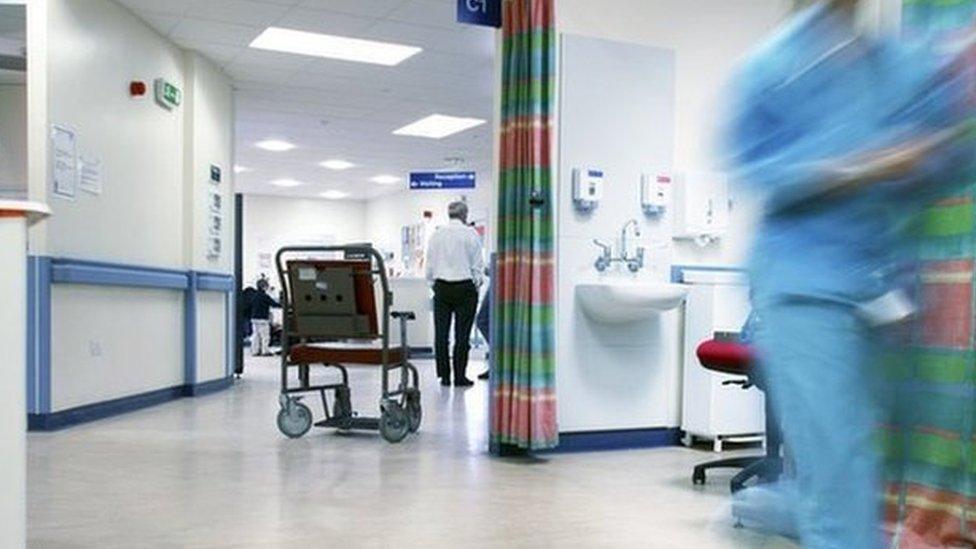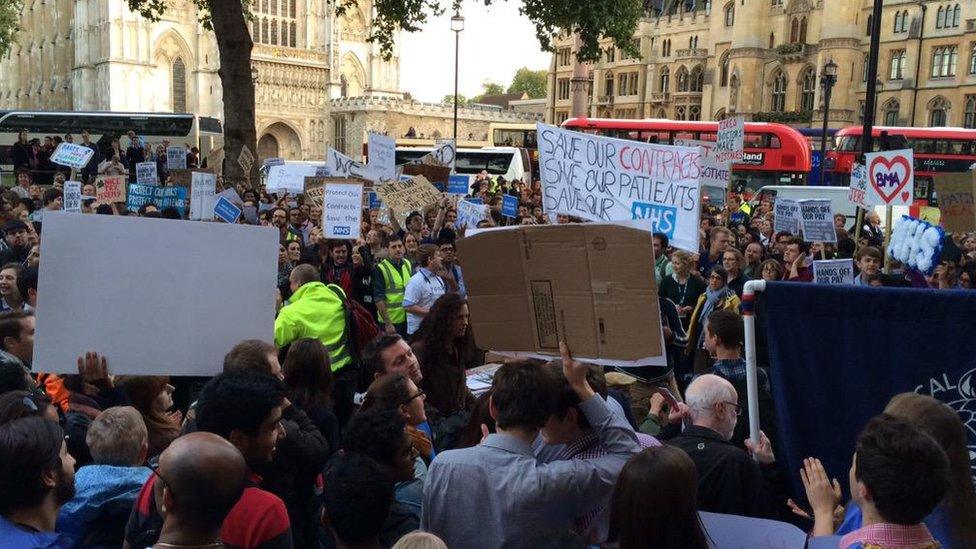What is the junior doctors row about?
- Published

Ministers and junior doctors are locked in a dispute. This week ballot papers are being sent out by the British Medical Association asking its members whether they want to take industrial action.
But what exactly is this row about? And could it end up with junior doctors going on strike?

What has caused the dispute?
Junior doctors' leaders are objecting to the prospect of a new contract.
The government has described the current arrangements as "outdated" and "unfair", pointing out they were introduced in the 1990s.
Ministers drew up plans to change the contract in 2012, but talks broke down last year.
The government has indicated it will impose the new contract next year in England.
The BMA has responded by initiating the industrial action process.
Ballot papers go out on Thursday with the vote open for two weeks.

How is the contract changing?

The case for contract reform surrounds inconsistencies in a "highly complex" system
There are many elements to what is being proposed - and the details have been tweaked as the dispute has rumbled on.
The latest information provided by the government, which is the most detailed so far, includes an 11% rise in basic pay for doctors.
But that comes at a price. Other elements of the pay package are being curbed.
For example, the number of hours during the working week that are classed as unsociable - and therefore attract an extra payment - are being cut.
Guaranteed pay increases linked to time in the job are being scrapped and replaced with a system linked to progression through set training stages.
This, the BMA argues, affects people who take time out to have a baby, for example.
They are also concerned that some doctors will end up being paid less and that the restrictions on the number of hours being worked by doctors are not strong enough.

Will doctors lose pay?
To start with, it seems not many will. Ministers have said three-quarters will actually be better off - although this is likely to be by only a small amount.
Of the rest, only 1% will earn less - and these are the doctors who do lots of extra hours and therefore currently qualify for more of the premium payments that are going to be scrapped.
That leaves just under a quarter of doctors who will earn about the same. But a number of these - the government isn't saying how many - are only escaping a cut because they are going to have their pay packets topped up until they change roles.
That is to ensure Health Secretary Jeremy Hunt can keep his promise that no doctor working a normal number of hours will end up worse off.
But these changes are not just about winners and losers on day one. They have partly been designed to make it cheaper to roster extra doctors on at weekends.
Therefore medics are likely to find they are working more weekends, which under the existing contract would have lead to extra pay.
What is more, some of the changes will take time to have an effect. For example, the ending of guaranteed pay rises linked to time-in-the-job will mean some doctors find their pay will go up more slowly during their time as a junior medic.

Is there a wider context to this?

Yes. You may have noticed the government in England is intent on improving the range of services that are available seven days a week.
It has already found itself at loggerheads with the BMA over plans to change the consultants' contract - talks are under way on that.
Junior doctors already work weekends - in fact, they provide the bulk of the medical staffing on Saturdays and Sundays.
But the financial benefit of extending what constitutes "normal hours" to a Saturday is obvious.

What about the rest of the UK?
The dispute over the contract is an England-only issue.
Scotland and Wales have both said they will be sticking to the old contract, while Northern Ireland has yet to make a decision.
This is largely because they do not have the pressures on costs in terms of seven-day services.
While there are moves to improve access to care at weekends elsewhere in the UK, the plans are not on the scale of what the government in England is trying to achieve.
For example, in Wales the focus has been on more weekend access to diagnostic tests, pharmacies and therapies rather than creating more seven-day working across the whole system.

Could doctors go on strike then?

Junior doctors took part in a protest in central London earlier this year
Doctors can take strike action but only if it affects non-emergency care.
The last time this happened was during the pensions dispute in 2012, but that was the first time such action had been taken for almost 40 years.
Doctors still attend work - so they are ready for urgent and emergency cases.
But three years ago, GP appointments, routine hospital check-ups and non-emergency operations such as knee and hip replacements were affected.
Obviously not all of these services are dependent on junior doctors, but services could still be disrupted.
Another option would be a work-to-rule, with junior doctors not working beyond their paid hours.
- Published22 September 2015
